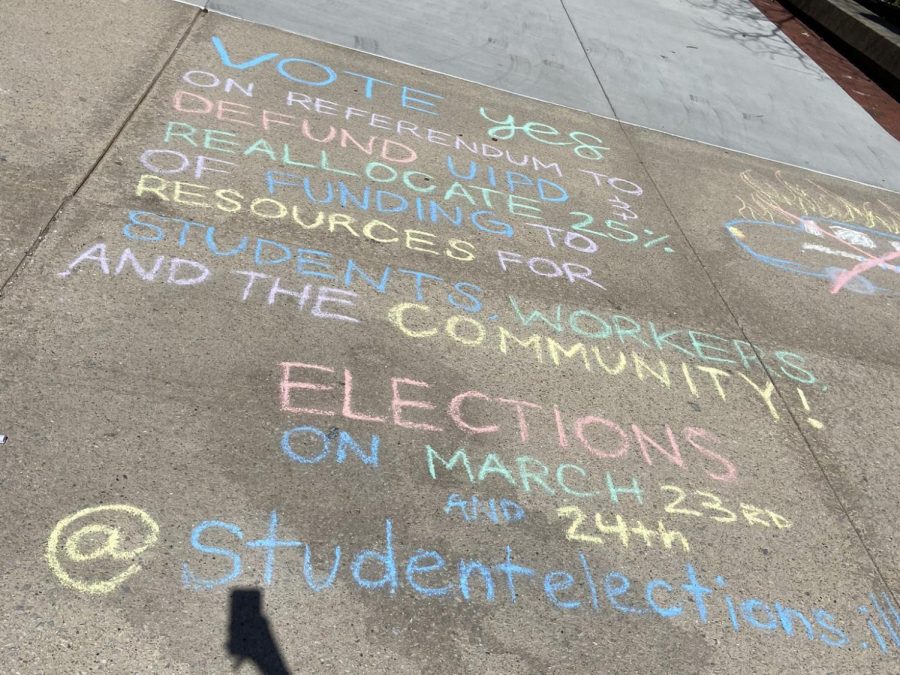Students vote on reallocation of UIPD budget
Photo Courtesy of Twitter User @haki_shabazz
University students denounce the University of lllinois’s Police Department in chalk in front of the Union on March 20. This past week, students had the ability to vote for reallocating part of the UIPD’s budget toward other more worthy resources.
March 29, 2021
This past week, students had the opportunity to vote for or against the 25% reallocation of the University of Illinois Police Department’s budget towards resources for the community, students and staff.
This referendum was propagated by Defund UIPD, an organization on campus that dedicates its efforts to pushing the redistribution of money from UIPD to the local community and campus necessities.
According to a survey put out by Graduate Employees’ Organization and Defund UIPD, about two million dollars are allocated towards campus mental health resources, while about eight million are dedicated toward the police department. This same survey was used to see what students wanted to see more funding in.
“It would be great if we could have a referendum that lets us choose where that money goes,” said Drake Materre, University alum and member of the Black Students for Revolution. “We know that is a lofty goal but 25%, two million dollars, that can create community across campus itself because it discusses what all our different students want,”
Another reason that this reallocation is being pushed forward is due to reported misconduct by police officers on campus.
Chelsea Birchmier, graduate student in LAS, mentioned her experiences taking a required training with a UIPD police officer.
“Among many problematic things that this officer told us, he told us that he could locate us at any time and that ‘If you make me mad, I can come find you.”
Birchmier also said that this officer was charged with sexual assault on several occasions and had been suspended for these cases from 2015 to 2018.
The officer wasn’t suspended after the first few offenses due to the protection of the Police Union, an organization that protects police officers from being penalized for misconduct, according to Birchmier.
Birchmier says this was one of the many reasons as to why the police are shielded from consequences.
According to the Illinois Criminal Justice Information Authority Research Hub, 7% to 10% of police-citizen interactions involve a citizen with a mental health disorder, and that these officers are 1.4 to 4.5 times more likely to use force during these interactions.
“When we were looking at the reports of UIPD arrests and tickets, we were constantly asking Chief Alice Kerry and other officers if the Black population is only 5.7%, why are they making up 42.6% of the UIPD arrests and tickets?” said Becca Maree, University alum and Grantmakers for Effective Organizations staff member.
“I do really feel there is an unfortunate issue going on with the mental health services,” Sean Jung, senior in LAS, said. “It does not have adequate funding and I have first hand felt that.”
Although Jung recognizes a lack of mental health resources at the University, he feels the UIPD is doing a good job at policing, in comparison to other universities.
“When you look at statistics comparing crime rates from our campus to similar state schools, the UIPD does a great job at helping the community keep those crime rates low,” Jung said.
According to College Factual, the University’s on-campus crime statistics reported 461 cases in 2019, whereas Indiana University’s on-campus crime statistics reported 2,107 cases.
“I would say it is comforting when you’re walking home alone from the bars and you can see that there’s a couple of UIPD around to assist anyone if needed,” Yung said.
According to a survey conducted at Troy University, when ranking what should be done to make campuses safer, 55% of students said “more police officers.”
“It’s not like they get a whole bunch of funding and they’re never there to help us out,” Jung said in regard to the nights where students are walking home from bars and notice officers patrolling the area, “I would say it’s comforting.”
Jung stated he feels the community would see a rise in an abundance of other consequences due to the lack of police presence on campus.
“I think it’s a matter of if we try to pull that funding out of something that’s working well like UIPD, then we’re gonna see a rise of a bunch of other problems that we don’t want to see,” Jung said. “Don’t fix it if it ain’t broke.”
“We do not take a position on student advisory referendums, but we have efforts underway to engage in dialogue about how UIPD can best serve the campus community and the greater Champaign-Urbana community.” Patrick Wade, media executive director of the UIPD, said in an email. “This is one part of a broader conversation we are having here and throughout the nation about how we keep people safe. We are listening, and we intend to be among our community leaders who are forging a path forward that works for all people.”







